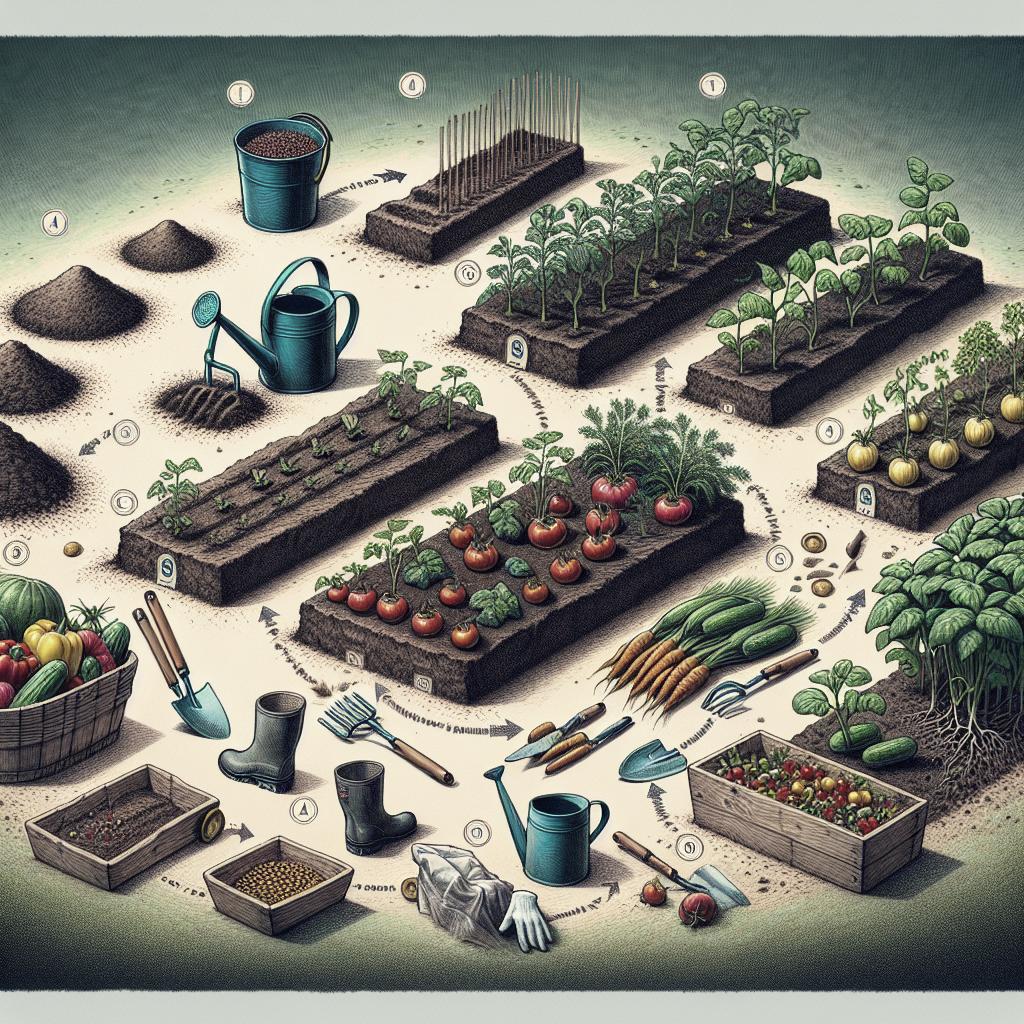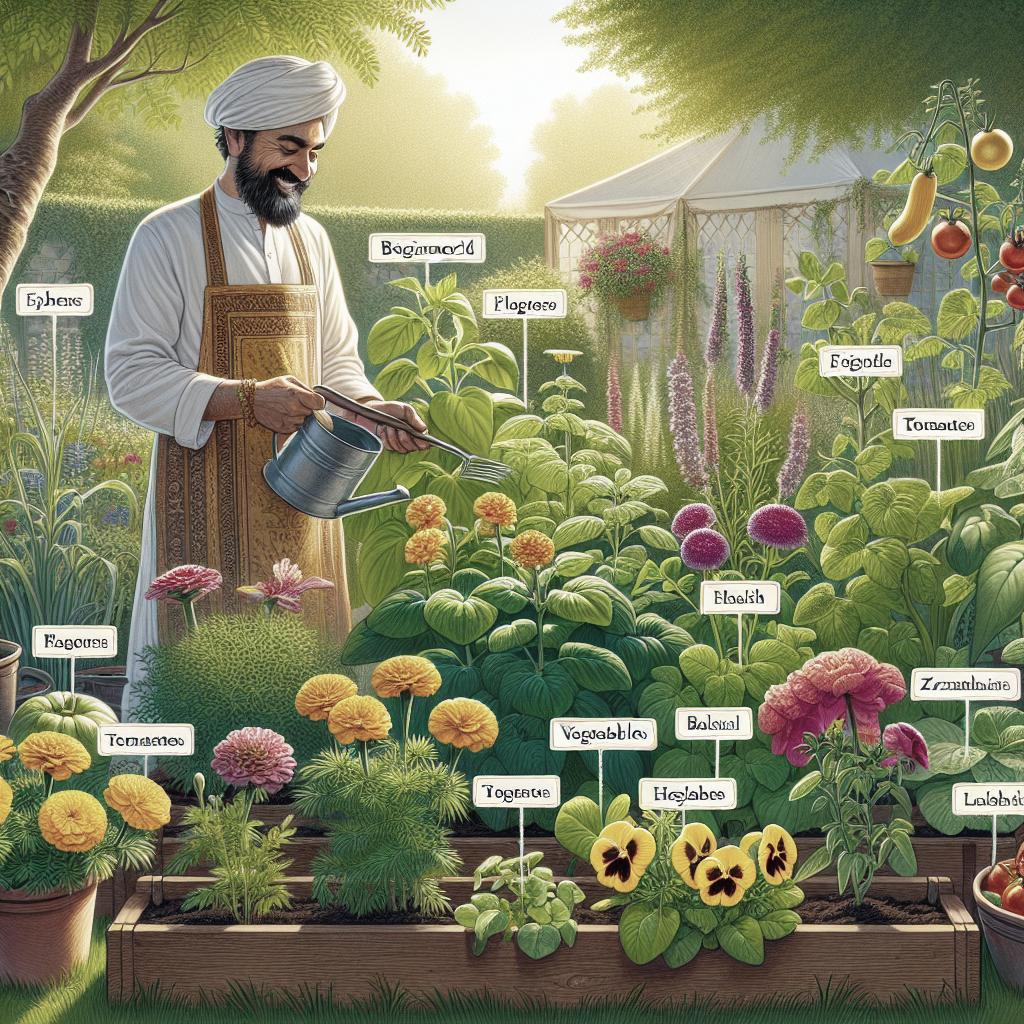“`html
Best Fertilizers for Vegetable Gardens
Growing a bountiful vegetable garden requires not only dedication and care but also the right nutrients to nourish your plants. Fertilizers play a crucial role in providing these essential nutrients, ensuring that your vegetables thrive. In this comprehensive guide, we will explore different types of fertilizers, including organic options such as compost and manure, as well as specific nutrient-rich fertilizers like blood and bone meal. You’ll also find information on the best slow-release and liquid fertilizers, along with answers to frequently asked questions, and tips on organic pest control. Discover effective methods for managing common garden pests like squash bugs, cabbage worms, and aphids. Enhance your gardening knowledge and cultivate a vibrant, productive vegetable garden with the insights provided here.
Different Types of Fertilizers for Vegetables
1. Compost
Compost is a powerhouse of nutrients and an excellent all-purpose fertilizer for vegetable gardens. It is created by decomposing organic materials such as kitchen scraps, garden waste, and leaves. The resulting humus is rich in beneficial microorganisms and nutrients that enhance soil structure and improve moisture retention.
Using compost in your garden not only enriches the soil but also encourages healthy root development. It reduces the need for chemical fertilizers and helps suppress plant diseases. To make the most of compost, apply a generous layer over your garden beds and lightly work it into the soil before planting.
2. Manure
Manure, especially if well-rotted, is another valuable organic fertilizer. It is high in nitrogen, phosphorus, and potassium, which are key nutrients for plant growth. Different types of manure, such as cow, chicken, or horse manure, may vary in nutrient content, so it’s advisable to choose based on the specific needs of your plants.
Before using manure, it should be well-aged to prevent burning the plants with excess nitrogen. Incorporating manure into the soil during the fall or early spring ensures it breaks down and becomes an effective nutrient source by the time planting season begins.
3. Blood Meal
Blood meal is a potent organic fertilizer that provides a high concentration of nitrogen, making it an excellent choice for leafy vegetables that require lush green growth. As a byproduct of the meat industry, blood meal is also a sustainable option, recycling waste into a valuable gardening resource.
However, blood meal should be used sparingly as an overdose can have adverse effects, such as attracting animals. It is best applied in small quantities as a side dressing or incorporated into the soil to maintain balanced nutrient levels.
4. Bone Meal
Bone meal is a phosphorus-rich fertilizer derived from animal bones. It is particularly beneficial for promoting root development and flowering. Vegetable plants like tomatoes and peppers benefit from the steady supply of phosphorus that bone meal offers.
To maximize its effectiveness, apply bone meal to the planting holes or as a top dressing during the growing season. Its slow-release nature ensures a prolonged supply of nutrients, supporting the overall health and productivity of your plants.
5. Worm Castings
Considered one of the most nutrient-rich fertilizers available, worm castings are the excretions of worms. They are high in essential nutrients and beneficial microorganisms that enhance soil health, improve aeration, and increase water retention.
Using worm castings in your garden can boost plant growth and productivity while offering a natural deterrence against pests and diseases. They can be mixed into the soil, used as a top dressing, or made into a nutrient-rich tea to feed your vegetable plants.
What is the Best Fertilizer for a Vegetable Garden?
Best Slow Release Vegetable Fertilizers
Slow-release fertilizers are formulated to provide consistent nutrient supply over an extended period. This reduces the frequency of application and ensures that plants receive a balanced intake of nutrients. Granular products or organic matter with natural slow-release properties, such as compost and bone meal, are popular choices.
These fertilizers are particularly useful for busy gardeners who want to maintain a healthy vegetable garden without frequent interventions. They can be worked into the soil prior to planting, providing a steady nutrient flow as the plants grow.
Best Liquid Fertilizers for Veggies
Liquid fertilizers are effective for delivering nutrients directly to the plant roots and foliage. They are quickly absorbed, offering immediate nourishment and are ideal for fast-growing vegetable crops. Common liquid options include fish emulsion, seaweed extract, and compost tea.
These fertilizers should be applied during the growing season and can be delivered through foliar feeding or soil drenching. Regular use ensures vibrant growth and can supplement any nutritional gaps left by other fertilizers.
My Top Choice for Fertilizing Your Vegetable Garden in 2023
For a comprehensive approach to vegetable gardening in 2023, combining organic compost with a slow-release fertilizer like bone meal is an excellent choice. This combination offers a balanced nutrient profile and supports robust plant growth throughout the season.
Additionally, integrating liquid fertilizers such as fish emulsion can give your plants a quick boost during critical growth phases. This multifaceted approach leverages the best of organic and slow-release fertilizers, ensuring that your garden remains productive and healthy.
FAQs
1. Can I Use Compost for Fertilizing My Vegetable Garden?
Absolutely! Compost is highly recommended for vegetable gardens because it adds organic matter, improves soil structure, and provides essential nutrients. It is particularly effective if you prefer a chemical-free approach to gardening.
2. What Types of Fertilizers Can I Use to Maximize Growth In My Vegetable Garden?
To maximize growth, combine various types of fertilizers. Organic options such as manure and compost enrich the soil, while bone meal can support root development. For fast-acting results, consider liquid fertilizers like fish emulsion.
3. How Often Should I Apply Fertilizer to My Vegetable Garden?
The frequency of fertilizer application depends on the type of fertilizer and your specific garden’s needs. Organic fertilizers like compost may be applied once a season, whereas liquid fertilizers could be applied bi-weekly during the growing season.
4. How Can I Determine Which Type of Fertilizer is Best for My Vegetable Garden?
Assess your soil quality and the nutrient demands of your vegetable crops. Conducting a soil test can provide insights into nutrient deficiencies and guide your selection of the most appropriate fertilizers.
How to Get Rid of Squash Bugs Naturally
Squash bugs, notorious for damaging squash and pumpkin plants, can be managed using natural methods like handpicking and using floating row covers to prevent infestations. Encouraging natural predators, such as spiders and birds, can also help control their population.
Additionally, neem oil and insecticidal soap are effective organic options for maintaining a squash bug-free garden. Regular monitoring and early intervention play key roles in keeping your vegetable garden healthy and productive.
How To Get Rid of Cabbage Worms Organically: A Complete Guide
Cabbage worms can be particularly damaging to brassica crops if left untreated. Employing Bt (Bacillus thuringiensis) can prove highly effective as an organic pesticide, specifically targeting caterpillars without harming beneficial insects.
Companion planting with herbs like thyme or fragrant plants like marigold can also deter cabbage moths and reduce worm infestations. Regular inspection and physical removal of worms ensure they do not get a chance to proliferate.
The BEST Natural Way to Get Rid of Aphids
Aphids are small, sap-sucking insects that are detrimental to various vegetable crops. Introducing beneficial insects like ladybugs or deploying a strong jet of water to dislodge them are natural and effective methods.
Creating a homemade spray using water and a few drops of dish soap can also serve as a gentle yet effective deterrent. Supporting predatory insects and maintaining good garden hygiene can keep aphid numbers in check.
Summary of Main Points
| Fertilizer Type | Main Benefits | Application Tips |
|---|---|---|
| Compost | Improves soil structure and moisture retention | Work into the soil before planting |
| Manure | High nitrogen, phosphorus, and potassium | Use well-aged and incorporate into soil |
| Blood Meal | High nitrogen content for leafy growth | Use sparingly to avoid over-fertilization |
| Bone Meal | Promotes root development and flowering | Apply to planting holes or as a top dressing |
| Worm Castings | Nutrient-rich with beneficial microbes | Mix into the soil or use as top dressing |
“`


